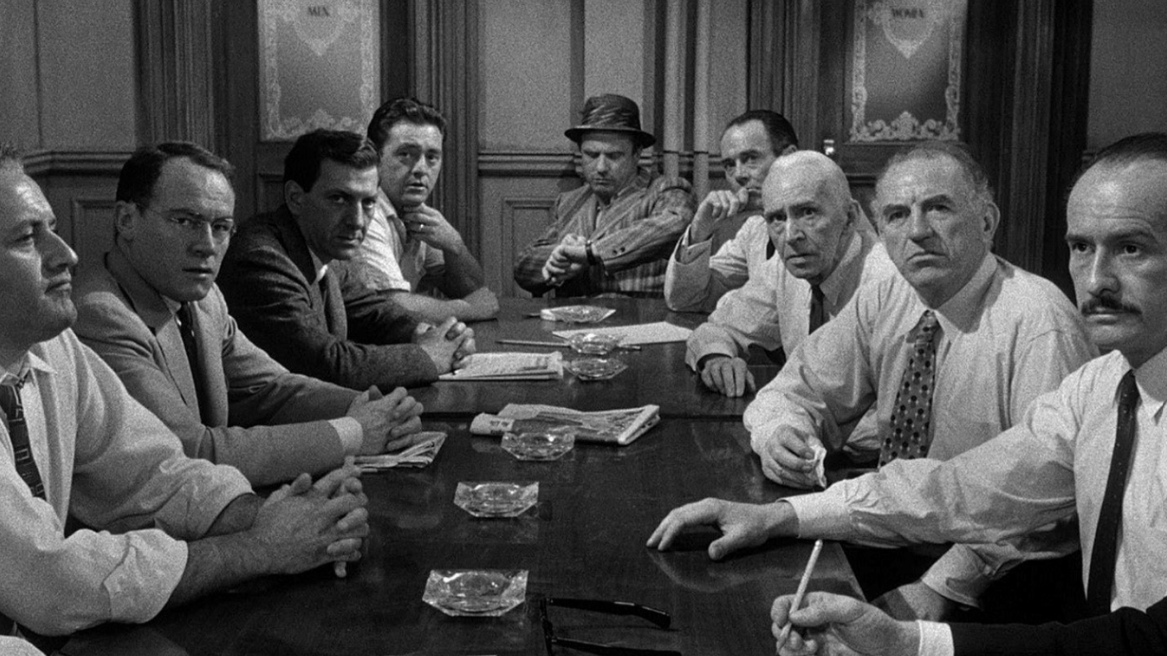The film adaptation of a play by the same name, “12 Angry Men,” is a riveting courtroom drama that unfolds almost entirely within the confines of a single jury room. Directed by Sidney Lumet and released in 1957, the film centers around the deliberations of twelve jurors tasked with deciding the fate of a young man accused of murder.
The story begins as the jury starts to discuss what initially seems like an open-and-shut case. The accused, a teenage boy from a marginalized background, stands accused of killing his father with a switchblade knife. With seemingly overwhelming evidence against him, the jury’s initial inclination is to reach a guilty verdict.
However, one juror, known only as Juror #8 (played by Henry Fonda), is not convinced of the defendant’s guilt. Despite facing intense pressure from his fellow jurors to conform to the majority opinion, Juror #8 steadfastly maintains his belief in the defendant’s innocence. Over the course of the film, he systematically dismantles the prosecution’s case, raising doubts about key pieces of evidence and exposing the biases and prejudices of his fellow jurors.
As the story progresses, tensions run high within the jury room, with tempers flaring and conflicts escalating. Each juror brings their own biases, experiences and personal baggage to the table, leading to heated debates and impassioned arguments. Through these interactions, the film delves into themes of justice, prejudice and the power of individual conscience.
What sets “12 Angry Men” apart is its intimate focus on character and dialogue. The film unfolds in real-time, with Lumet’s direction creating a sense of claustrophobia and tension within the jury room. Tight close-ups and subtle camera movements highlight the emotional intensity of the deliberations, drawing viewers into the drama unfolding on screen.
At the heart of the film is its stellar cast, led by Henry Fonda as Juror #8. Fonda’s portrayal of the lone voice in a room full of prejudiced men is nothing short of mesmerizing. His quiet strength and commitment to seeking the truth serve as the moral compass that guides the audience through the film’s journey.
But Fonda is not alone in delivering a standout performance. Each member of the jury, from Lee J. Cobb’s volatile Juror #3 to E.G. Marshall’s rational Juror #4, brings their character to life. Lumet’s direction is equally impressive, utilizing the confined space of the jury room adds to the immediacy and urgency of the deliberations.
One of the film’s greatest strengths lies in its ability to provoke debate and dialogue. It forces viewers to confront their own biases and preconceptions, challenging them to reevaluate their understanding of truth and fairness.
However, “12 Angry Men” is not without its flaws. Some critics have pointed out that the film’s portrayal of women and people of color is limited, with no female characters and only one juror of color. While this may reflect the realities of the time in which the film was made, it can be seen as a missed opportunity to explore issues of diversity and inclusion more deeply. Ultimately, “12 Angry Men” is a must-watch movie for lovers of all things controversial.


